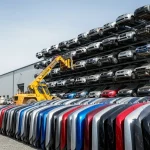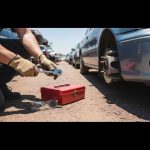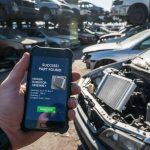If you are in need of car repairs, most likely you are afraid of the cost. The best way to avoid being ripped-off is to be prepared. Knowing how your vehicle works, basic knowledge on how to identify common problems a car can have is a great start. I would suggest asking someone who has the knows and hows to fix a car for some input on what could be wrong with your car. At my church we have some folks that either are mechanics or have very good knowledge on how to fix your car.
Choosing a good mechanic is key, make sure you ask them up front what they think the problem can be, what they will do to fix the car, and how much it will cost before you agree to start the work. Bring this information to another mechanic and ask how much they will charge you to do the same work and if they think it’s the right way to fix your car problem.
How to Choose a Mechanic Repair Shop
How to start the search for a good repair shop?
- Ask around, ask your friends, family members, church, facebook groups and people you trust for a good morals, not expensive car repair shop before you are in need of one, last minute decisions can cost you a lot.
- Call around, look online for customer reviews, ask for their hourly prices and cost to do the repairs you will be needing.
- Preferably look for those shop that are license by the state and are currently registered, looking at their complaint records help pinpointing the good ones from the bad ones. Look at the local consumer protection agency for records.
- Also ask them if they work with your vehicle’s warranty, some shops are authorize to do warranty repairs that are authorized by the car manufacture.
How to Pick the Right Car Technician
Newsflash: Not every car technician know the best way to fix your car
- Prefer shop that display their technician’s certifications, accredited by Automotive Service Excellence lets you know that one or more technicians in the shop have met basic standards of knowledge and competence on certain car technical areas. Make sure this certificates are current.
- Ask the shop if their technicians have experience working on your make and model, some vehicles require knowledge beyond just mechanical work, newer and more expensive vehicles work with fiber optics and wireless devices that a non certified technician should not touch.
Certifications alone, don’t mean good or honest work will be done, check their complaints and reviews.
Car Repair Charges: What you Should Know Before Starting the Work.
Before agreeing to get the work done, ask the shop how they price their work. Some shop charge a flat rate based on independent or by the manufacturer estimates on how long it should take for the repair to complete. While other auto repair shops charge you hourly rates, and on how long the technician took to repair the vehicle. This could be a good thing or a bad thing.
If the technician work slow of is not competent or know his stuff, the labor cost can be much greater, but if he know how to fix the issue in less than the estimated time, your could save hundreds.
If your repairs are complicated and will require your vehicle to stay at the shop for more than 24 hours, then you should consider a second opinion, ask for prices on both places and also look at their reviews
Ask them if they charge for the diagnostic, if you decide to go to the other shop, they may charge you for the time they took to diagnose the vehicle.
Some shops only do diagnostics, they done do the repairs nor sell parts, this can be a better option if you want to know what repairs are necessary on your vehicle. This shops do charge for the diagnostics.
If you decided to get the work done, ask them for a written estimate, detailing the work to be done, this estimate should have the problem to be fixed, the parts that are going to be repaired, the cost of the repair and needs to be signed.
You need to know about the parts being repaired or replaced on your vehicle.
When a repair shop replaces a part on your vehicle, you need to know the quality or condition of that part. Don’t think that every shop will install brand new auto parts on your vehicle, you need to know where the part came from before it gets installed on your car.
- NEW – This are parts that are either made by the original car manufacture (mostly called dealer parts or OEM parts) or by a separate company at the specifications of the manufacture. Most States require car repair shops to tell you if non OEM parts will be used on the repair of your car. Quality and prices of these part will vary.
- Remanufactured, reconditioned or rebuilt – This terms usually mean the same, the parts have been restored to a working condition. Lots of manufactures offer warranty on their parts, but not the labor to install them, meaning.. if the part stops working after the installation, you will need to pay again for the labor to replace it.
- Salvage Parts – This are usually used OEM parts, taken out other vehicles at either a junkyard or bought online as second hand. This parts can be a lot cheaper and work great, but they don’t carry any warranty, except for that from the salvage yard which is usually 30 days.
Once the work is done, you should ask for a complete repair order, listing the parts that were replaced, each repair done to the vehicle. some shop charge you disposal charges, sometimes is best if you ask for the parts back and you take them to a scrap yard.
Car Scheduled Maintenance
What happens if you keep ignoring your vehicle maintenance?
A vehicle consist of many parts that work together. Ignoring or postponing the maintenance of your vehicle could lead to the failure of one part or a complete system, this can be catastrophic and your vehicle can become unresponsive, not drivable and can cost you lots of money to fix. Routinary maintenance like changing the oil, checking coolant levels can improve the fuel economy of your vehicle and prevent costly breakdowns due to neglect on your part. Also some dealerships and car manufactures can void your warranty if you don’t follow up with schedule maintenance to your car or truck.
It is highly recommended that you follow the manufacturer scheduled maintenance guide in your owners manual, this maintenance consist of your driving habits, the type of terrain and load on the vehicle. Some repair shops follow a more frequent maintenance schedule than the one recommended by your car manufacture manual. Some of these recommendations are ok, but sometimes they try to take advantage of unnecessary suggestions to get your money.
Take Your Car In If You Hear Something Wrong.
If your vehicle starts to squeak, rumble, rattle, squeal, this could indicate that something is wrong and you need to address the issue before it gets worst.
Meaning of some common noises people hear coming from their vehicles:
- Squakes or Squeals: This are related to engines, if you hear a shar noise or shrill, you could have a loose or worn out air conditioning, fan or steering belt.
- Clicking Sounds: Usually is a sharp noise, this happens when the vehicle is in motion, could indicate a loosen wheel cover, a fan blade that got loose or bent, low engine oil (maybe a leak).
- Rumbles: If your vehicle starts to sound like a beatbox, having a ritm of it own, you could have a damaged exhaust pipe, a universal joint, muffler or converter.
When taking your vehicle to a shop for regular maintenance, make sure you know what you are going in for, they will probably try to upsell you everything your vehicle probably doesn’t need. CBC did a investigation on well known companies that were scamming people for services their vehicles didn’t need, to the point of lying and telling people they did the work and not even touching the vehicle. See below.
No all mechanics are crooked, but they have a bad reputation because of a few bad apples. Bring your car in, ask them how much for the repair, get it in writing and the agree to it.




